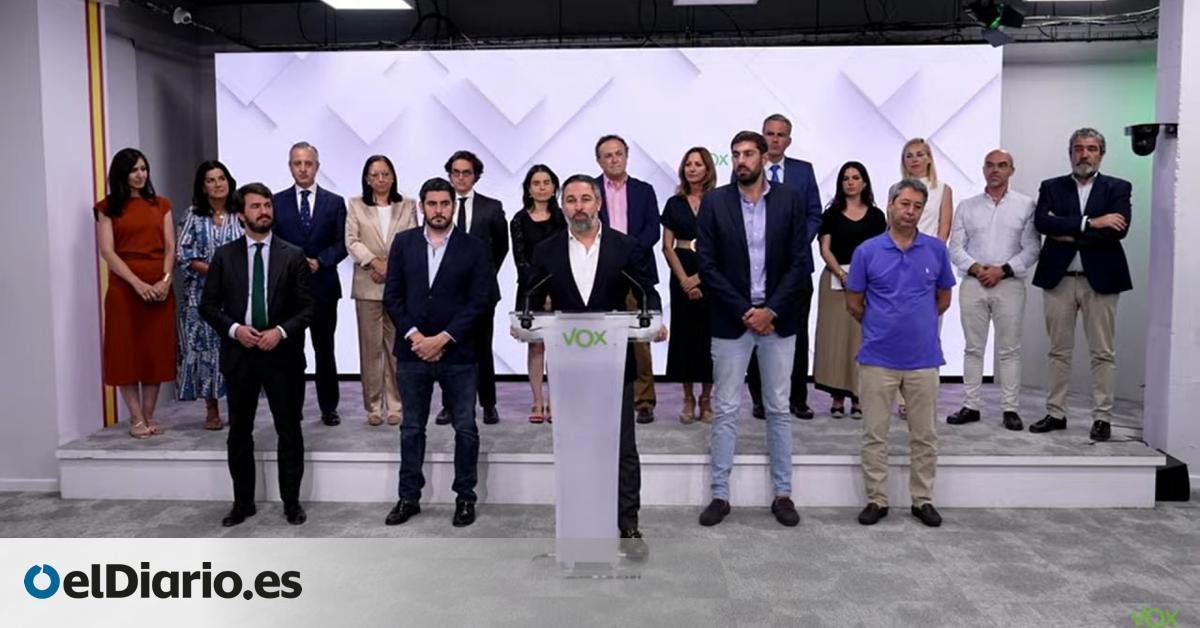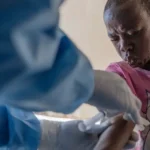
The leadership of Vox, chaired by Santiago Abascal, has decided to formalize this Thursday the breaking of the government pacts signed with the PP once it has verified that its partners have agreed to host in those territories a quota of unaccompanied minor immigrants, a measure that the far-right party flatly rejects. Vox will from now on not give parliamentary support to the PP governments and its officials will resign over the next few days.
Abascal began his appearance by saying that today’s decision is “one of the most important in the political history of Vox,” and he launched harsh criticism against Alberto Núñez Feijóo for his pacts with “the autocrat,” in reference to his agreements with Pedro Sánchez. “Nobody has voted for Vox, and I would dare say that they have not voted for the PP either, so that the invasion of illegal immigration and ‘menas’ continues,” he said. “We have given in many times to safeguard these governments but it is impossible to make a pact with those who do not want to do so,” he complained.
In his institutional statement, without questions, the far-right leader has ruled that for all this “the National Executive Committee of Vox has confirmed that the regional agreements are broken as a consequence of Mr. Feijóo’s aggression”, and “agrees to withdraw parliamentary support for the governments of Extremadura, the Balearic Islands, Aragon, the Valencian Community, Castile and Leon and Murcia”.
“The vice-presidents of these governments will announce their resignation and Vox will join the opposition, as loyal as it is forceful, just like in the rest of Spain,” Abascal concluded in his appearance, in which he was surrounded by members of the national leadership.
Abascal continued to attack the leader of the PP: “Mr. Feijóo has first dedicated himself to preventing and then torpedoing all agreements with Vox in the regions and we have to say that he has succeeded. Yesterday he forced his regional presidents to agree with Sánchez on a new distribution of illegal unaccompanied minors and he did so knowing that his governing partner in several regions of Spain – Vox – did not like it, did not agree and was very concerned about it,” he added.
Abascal has delayed his appearance for more than an hour and a half due to the strong internal debate that arose during the meeting, which began at 6.30 pm at the headquarters of the far-right party. Although there was no shortage of doubts and questions about what will happen from now on, the decision was ultimately supported by the entire Executive.
Despite this apparent closing of ranks, it remains to be seen whether Abascal’s drastic decision will not trigger a new internal crisis in the party in the short or medium term. In some regional parliaments this morning, the discontent of some councillors was palpable, as they have no other income when leaving their posts, given that the regime of incompatibilities in Vox is strict. In informal conversations with journalists, the majority confessed that they were happy to govern with the PP.
Another possibility now looming in the air is whether any of the PP barons who are going to stop governing with Vox will decide to call early elections in their autonomous regions.
Abascal: “I wouldn’t be able to go out on the street if I didn’t keep my word”
This morning, upon his arrival at the Plenary Session of Congress, Abascal confirmed his decision to break those agreements: “I could not go out on the street tonight if I do not keep my word. And if I cannot go out on the street, I would cease to be president of Vox,” he said. Sources from the far-right party regret the leader’s decision but insist that the PP “has left them no other choice.”
The anger of the Vox leadership with Feijóo, however, is shared by everyone since they consider that he has been “swindling” his voters: “The PP has agreed to courts with the PSOE, has reached agreements in Brussels and in the CCAA, and now they have blown up the government pacts, voluntarily taking in 400 ‘unaccompanied minors’,” Abascal lamented. “To swindle, plunder, and endanger the Spanish people, they cannot count on us,” he has also repeatedly stressed these days.
The first to stage the divorce were the two Vox councillors in the Region of Murcia, the vice-president José Ángel Antelo and the Minister of Public Works, José Manuel Pancorbo, who this Thursday decided to stand up the president of the regional government, Fernando López Miras, of the PP, and did not attend the meeting of the Government Council, as reported by Cadena SER and confirmed by elDiario.es. This is the first move by the far-right party after threatening Feijóo’s party with breaking the agreements if they agreed with the PSOE on the distribution of migrant minors.
In Aragon, the two Vox members of the regional government, the vice president, Alejandro Nolasco, and the Minister of Agriculture, Ángel Samper, also decided to cancel the official events they had scheduled for this Thursday.
In Castilla y León, the vice president of the Junta, Juan García-Gallardo, warned on Wednesday that he was willing to resign rather than “lose his honour”. In addition to him, the Executive includes Mariano Veganzones Díez, Minister of Industry, Trade and Employment; Gerardo Dueñas, Minister of Agriculture, Livestock and Rural Development; and Gonzalo Santonja, Minister of Culture, Tourism and Sport.
All the PP’s appeals for Vox not to carry out its threats have been unsuccessful. The deputy secretary of regional policy for the PP, Elías Bendodo, revealed on Thursday morning that until then “no one from the Vox leadership had contacted the PP leadership” to discuss the future of the pacts after the Youth and Childhood sector conference held yesterday to also address the reform of the Immigration Law. “Vox will have to decide what it wants to be, whether a government party or a party to protest,” Bendodo said in statements to the media in Congress. In addition, he said he was “proud” of the unanimous decision of the regional presidents of his party to continue taking in unaccompanied minors, despite the fact that the PP has blocked the distribution of thousands of these children taken in by the Canary Islands and has not yet revealed whether it will support the reform of the law to make the agreements reached at the sector conferences binding.
Source: www.eldiario.es

